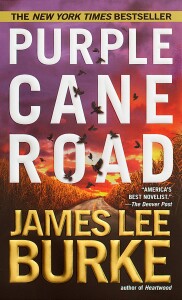 Dave Robicheaux is a middle-aged guy, trying to get along. Still haunted by his experiences in Viet Nam, troubled by his relationship with his long-dead parents, he is now a homicide detective in New Iberia Parish in Louisiana. His second wife, Boots, his adopted daughter, Alafair, and his old New Orleans Police Department partner, Clete Purcell provide support as Dave deals with murder, mystery and the slimy side of the world.
Dave Robicheaux is a middle-aged guy, trying to get along. Still haunted by his experiences in Viet Nam, troubled by his relationship with his long-dead parents, he is now a homicide detective in New Iberia Parish in Louisiana. His second wife, Boots, his adopted daughter, Alafair, and his old New Orleans Police Department partner, Clete Purcell provide support as Dave deals with murder, mystery and the slimy side of the world.
Purple Cane Road is the latest in a long series of novels which detail Dave’s life and adventures. It is the eleventh tale, and it delves deep into Robicheaux’s murky past, as he attempts to shine a light on what the truth is involving his mother and her death. At the same time he is very much involved in an ongoing investigation concerning the murder of a local denizen.
James Lee Burke is a master at spinning these yarns. He crafts an intricate web of plot and character development that doesn’t rely on misinformation and red herrings (as many “detective” stories do). The Robicheaux world is painted in the same shades and tones as the real Louisiana bayou. You can smell the humidity, the crab cakes, the gumbo, you can feel the heat. Burke is a tremendously gifted writer and the characterization in his novels lift the books into the third dimension.
In Purple Cane Road Dave is making a routine bust when the pimp he’s arresting recognizes him and says, “Aren’t you the son of that whore that the cops murdered back on Purple Cane Road?” This sets Robicheaux on an odyssey of guilt, recrimination and revenge that nearly destroys his career. In the meantime he solves a couple of other crimes, and interacts with a parade of interesting and mind-boggling villains, not the least of which is ex-cop (and sidekick) Clete, who manages to get beaten up as often as he beats others.
The family dynamic is an ongoing theme in this series as Dave attempts to atone for the failures in his upbringing in his fathering of his adopted daughter, Alafair; and as he seeks to work through all the rough patches in his married life with Bootsie. Their love is evident and real, just as is their exasperation with each other.
Burke’s portrayal of Cajun Louisiana, his usage of various dialects, his obvious love of the people, their music and the food more than reflects this culture and makes his Robicheaux novels a treat. I can’t recommend the novels of James Lee Burke more highly, and this new one is one of the best yet!
Other books in the Dave Robicheaux series are (chronologically) The Neon Rain, Heaven’s Prisoners, Black Cherry Blues, A Morning For Flamingos, A Stained White Radiance, In The Electric Mist With Confederate Dead, Dixie City Jam, Burning Angel, Cadillac Jukebox, and Sunset Limited.
James Lee Burke also has a new series which does for Texas what this series does for Louisiana! And Heaven’s Prisoners was made into a film starring Alec Baldwin and was a fairly accurate representation of the story, but somehow missed the magic that the printed word provides.
(Doubleday, 2000)
